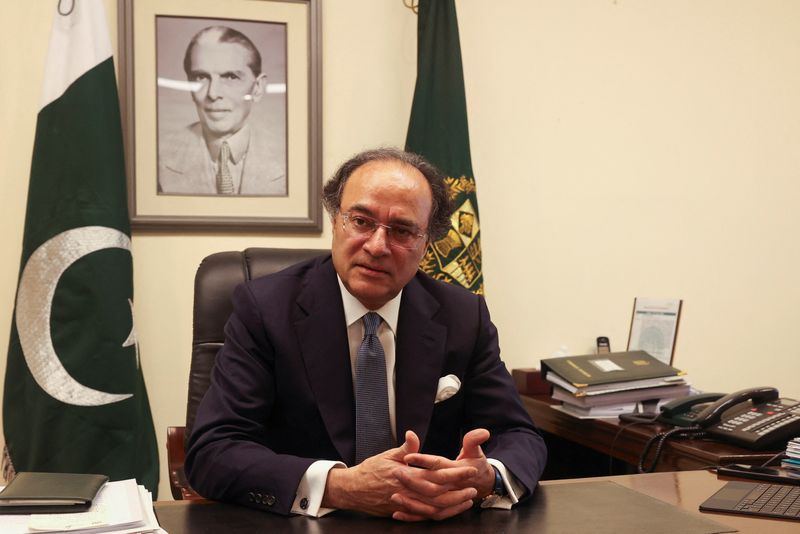By Karin Strohecker
WASHINGTON (Reuters) - Pakistan is targeting around $1 billion in a formal request for funding from the IMF facility that helps low and middle income countries mitigate climate risk, its finance minister told Reuters.
"We have formally requested to be considered for this facility," Finance Minister Muhammad Aurangzeb said in an interview on the sidelines of the IMF/World Bank autumn meetings in Washington.
The International Monetary Fund had already agreed a $7 billion bailout for Pakistan, but has further funding available via its Resilience and Sustainability Trust (RST).
The RST, created in 2022, provides long-term concessional cash for climate-related spending, such as adaptation and transitioning to cleaner energy.
"We think we are a very good candidate to be considered for a facility like this," Aurangzeb said, adding that they aim to conclude the request in the coming months.
The South Asian nation is one of the most vulnerable countries to climate change according to the Global Climate Risk Index.
Floods in 2022, which scientists said were aggravated by global warming, affected at least 33 million people and killed more than 1,700. The country's economic struggles and high debt burden impinged its ability to respond to the disaster.
Pakistan is also in talks with the Asian Infrastructure Investment Bank for a credit enhancement for a planned Panda bond, Aurangzeb said. It is targeting an initial issuance of $200-250 million by the end of June.
A Panda bond would be Pakistan's first foray into China's capital markets. Aurangzeb said they were talking to "a few other institutions" in addition to the AIIB for a credit enhancement.
Credit enhancements provide some level of guarantee for bonds, which can boost their rating, attract more investors and thus cut the government's borrowing costs.
Issuing in the world's "second largest and the second deepest" capital market was, Aurangzeb said, the key aim, rather than a particular issuance size.
"From our perspective it is diversification of the funding base," Aurangzeb. "Even if the inaugural issue is not significant in size, for us it is important that we print that and of course then we can keep it on tap."
Aurangzeb said Pakistan has engaged with Middle Eastern banks regarding commercial loans, and one had submitted "a relatively significant proposal."
Pakistan's foreign exchange reserves should reach $13 billion by the end of March, Aurangzeb said, which would help with commercial lending, and potentially its credit rating.
The foreign exchange reserves reached $11.04 billion in the week ending Oct. 18, the central bank said.

Moody's (NYSE:MCO) upgraded Pakistan's ratings to 'Caa2' in August, citing improving macroeconomic conditions, and Fitch boosted its rating to CCC+ in July following the IMF staff level agreement. But both ratings are sub investment grade.
(This story has been refiled to fix a typo in paragraph 1)